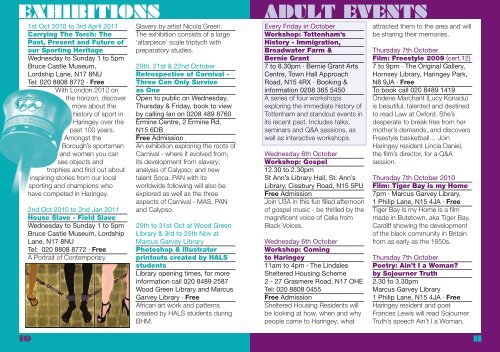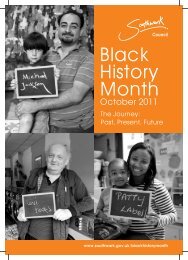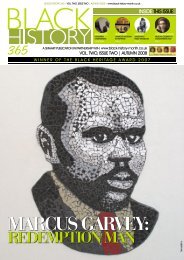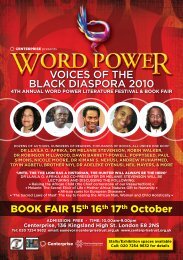black history month now
black history month now
black history month now
- No tags were found...
Create successful ePaper yourself
Turn your PDF publications into a flip-book with our unique Google optimized e-Paper software.
Bernie Grant: a reflection<br />
On 18 April 2000 thousands of<br />
people lined the streets of Haringey<br />
to follow the last journey of a<br />
charismatic political leader. Bernie<br />
Grant had been the Labour leader of<br />
Haringey Council during the politically<br />
turbulent mid 1980s and went on to<br />
become the Member of Parliament for<br />
Tottenham in 1987 until his death in<br />
2000. The mass funeral attended by<br />
some 4000 people at Alexandra Palace<br />
made this one of the largest ever public<br />
tributes to a <strong>black</strong> person in Britain.<br />
There was a strong sense that a strong<br />
and brave voice had been silenced.<br />
And so it had. Bernie Grant, the most<br />
outspoken <strong>black</strong> political leader in<br />
recent times, had been a force for<br />
racial and social justice for over three<br />
decades, and was a champion and<br />
friend to many, in Haringey and far<br />
beyond. In making the transition from<br />
left wing activist to Parliamentary office,<br />
the story of his life mirrors the changes<br />
that the country was going through, as<br />
it attempted to come to terms with<br />
becoming a multi-racial society after<br />
decades of being an imperial power.<br />
Born into a family of teachers on 17<br />
February 1944 in Guyana, Bernie Grant<br />
left for England aged 19, to join his<br />
mother who was one of the very few<br />
<strong>black</strong> teachers in Haringey. By 1978 he<br />
became a full time Area Officer for the<br />
National Union of Public Employees<br />
(NUPE), responsible for its local<br />
authority and health workers. Bernie<br />
Grant then founded the Black Trades<br />
Unionists Solidarity Movement, and by<br />
1983 worked for it full time.<br />
He also became involved in the local<br />
community, especially around<br />
discrimination in education, and was<br />
elected a councillor for Bruce Grove in<br />
1978. He quickly gained the respect of<br />
other councillors, and by 1985 he had<br />
become the Leader of Haringey<br />
Council, responsible for its ethnically<br />
diverse population of 250,000 people.<br />
He was the first ever <strong>black</strong> person to<br />
hold such a position, or in fact to hold<br />
any real political power, in Europe.<br />
Equal opportunities policies and<br />
practices are <strong>now</strong> commonplace but<br />
this was not so in the 1980. Bernie<br />
Grant was a pioneer of equalities for all<br />
and insisted that Haringey Council’s<br />
jobs and services should be equally<br />
available to everyone.<br />
His uncompromising stance on these<br />
issues brought him an unwelcome<br />
national fame. The Tottenham<br />
electorate voted him into Parliament in<br />
1987, as one of the first <strong>black</strong> MPs in<br />
modern times. Famously, ever<br />
conscious of his ancestral roots, he<br />
entered his first State Opening of<br />
Parliament in African clothing, attracting<br />
outrage from some quarters - but huge<br />
respect from others.<br />
Bernie Grant had built up credibility<br />
with a range of communities who felt<br />
excluded from politics and from society<br />
in general. Migrants, <strong>black</strong> people,<br />
pensioners, alienated youth - all sought<br />
his support. He brought to Parliament a<br />
wealth of political experience, and<br />
quickly set about using his new status<br />
to take those issues forward locally,<br />
nationally and internationally.<br />
He came to be seen as the unofficial<br />
‘Minister for Black People’, and<br />
approached by individuals, British<br />
ministers and politicians, and even<br />
governments in Africa and elsewhere,<br />
who sought his advice or influence. He<br />
was a great orator, and his public<br />
speaking skills were in great demand<br />
both in this country and abroad. He<br />
travelled widely, especially to Africa<br />
and to his beloved Caribbean region.<br />
In 1990 he accompanied the African-<br />
American former presidential<br />
candidate, Reverend Jesse Jackson to<br />
South Africa, greeting Nelson Mandela<br />
on the day of his release after 22<br />
years imprisonment. And noting the<br />
problems that <strong>black</strong> people<br />
encountered across Europe, he<br />
founded the Standing Conference on<br />
Racism in Europe in 1990.<br />
Another important initiative was the<br />
Africa Reparations Movement (ARM) in<br />
Britain in 1993. As chair of ARM, he<br />
stressed the importance of <strong>history</strong> and<br />
heritage for African diaspora peoples:<br />
‘Only if we understand our past can we<br />
as Black People move forward in the<br />
future. We must demand<br />
compensation for the biggest crime in<br />
<strong>history</strong> – the colonisation and<br />
enslavement of our people.’<br />
For 13 years, he used the floor of the<br />
House of Commons to further his<br />
numerous campaigns against injustice<br />
at home and abroad. Throughout<br />
however, he was closely involved in his<br />
Tottenham constituency, and increased<br />
his majority at two subsequent general<br />
elections. Away from the public gaze<br />
he was re<strong>now</strong>ned for his empathy with<br />
the many who approached him with<br />
their personal difficulties. Queues at his<br />
MP’s advice surgery were legendary, as<br />
was his passionate advocacy for<br />
victims of injustice. Bernie Grant’s last<br />
big battle was to work towards<br />
establishing a dedicated <strong>black</strong> arts and<br />
cultural facility in his Tottenham<br />
constituency. His vision was fulfilled<br />
with The Bernie Grant Arts Centre<br />
opening in 2007. Sadly Bernie died on<br />
8 April 2000 at the age of 56. He is<br />
buried in Tottenham Cemetery.<br />
Official and public debates about<br />
racism, social equity and cultural<br />
identity were undoubtedly the richer for<br />
Bernie Grant’s sustained, committed<br />
contribution to political, socioeconomic<br />
and cultural life both in<br />
Britain and abroad. With his finely<br />
honed sense of social justice, his belief<br />
in equality for all peoples, and his pride<br />
in the <strong>history</strong>, culture and achievements<br />
of <strong>black</strong> diaspora peoples, successive<br />
generations will benefit from Bernie<br />
Grant’s work for many years to come.<br />
For more information, please refer to<br />
www.berniegrantarchive.org.uk<br />
6







